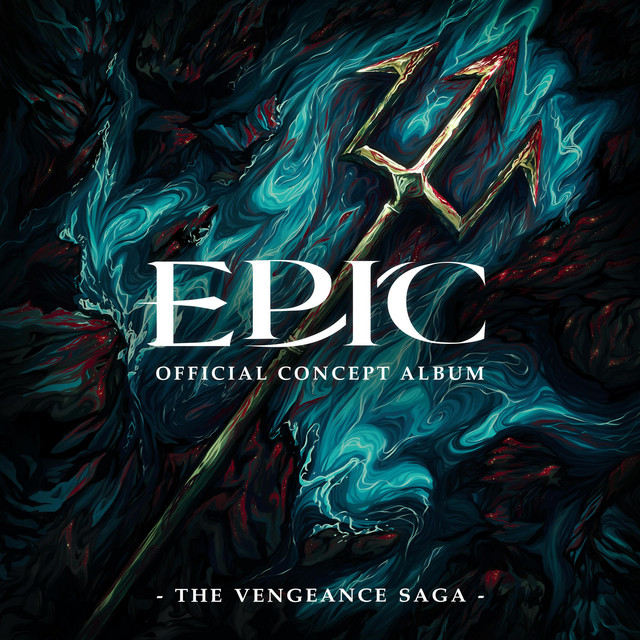“Epic” is an audio musical written by Jorge Rivera-Herrans, based on the Greek poem Homer’s “The Odyssey,” that follows the adventures of Odysseus. The musical is separated by various ‘sagas’, despite the fact that sagas are commonly attributed to Iceland and Scandinavia, which feature stories about vikings. Up until the newest saga, “The Vengeance Saga,” there have been seven other sagas. These sagas (in order) include: “Troy,” “Cyclops,” “Ocean,” “Circe,” “Underworld,” “Thunder,” and “Wisdom.”
The latest installment of the musical series “Epic” released Oct 31, 2024. “The Vengeance Saga” is the eighth of its kind, following the end of “The Wisdom Saga.” Odysseus was last seen stuck on the island of Calypso, while his ex friend/mentor Athena was arguing with the other gods to set Odysseus free from Calypso’s island. Calypso is an immortal demigod nymph who was cursed to fall in love with anyone who happens to wind up on her island. However, Odysseus refuses to fall in love with anyone other than his wife Penelope. The unyielding love for his wife is his number one motivation, whether it be motivation to fight in Troy, motivation to hold onto hope during a terrible storm, or even motivation to sacrifice his crew to have a chance to finally see her again. “She is my everything. My Penelope.”
The first song is called “Not Sorry for Loving You” which is sung by Calypso to Odysseus. The song starts with the same melody as the first time Odysseus meets Calypso, but instead of greeting Odysseus, Calypso informs Odysseus that someone has arrived to take him away from the island. Calypso, not ready to give up on Odysseus, sings about how she’s not sorry for loving him. In the song the only harmonies that happen are between Calypso and Odysseus’s voice.
The next song “Dangerous” starts with a motif from the third song of the entire musical called “Full Speed Ahead” where Odysseus would call out “600 men” and the crew would respond. This motif is repeated often, but this time it’s missing the response due to all of his crew being dead, most of whom were killed by Poseidon. As Odysseus is sailing on a handmade raft, Hermes appears to him and explains how he’s going to get home. This song is packed with different references and motifs from many of the past sagas, and its high up-beat nature leads to a pleasant listening experience. Odysseus is ready to take any risk he must make, even using trickery and ruthlessness.
The third and objectively most underwhelming song in terms of story and music in this saga is “Charybdis.” That does not mean the music is not pleasant to listen to or that the story is boring, but compared to the other four songs, this one feels lackluster. This song starts right away with Odysseus preparing to fight a sea monster called Charybdis who is known for making terrifying whirlpools and devouring ships. However, by the time it makes its first attack, Odysseus has already won. Using his prior knowledge Odysseus knows that Charybdis needs to swallow to attack, so by just not allowing it to spit all the water it has prepared, it will drown, which it does. After that, he finally sees his home land, he’s close and is ready to finally see his wife after 20 long years away. But, just as he readies to reach land, the ocean pulls him back.
“Get in the Water” is the fourth song in the saga, and the second song with Poseidon in the whole musical. Unlike the other songs in this saga, this song starts with speaking rather than singing, “there you are, coward.” This is a reference to the first time they face off, Odysseus uses the bag of storms that he saved to sail away rather than finishing the fight after Poseidon killed 545 men under Odysseus’s command. Poseidon was waiting for Odysseus to get close to home, just to pull him away at the last moment to remind the world that he’s cold, ruthless. Poseidon is aware that Odysseus is willing to do whatever it takes, so threatening Odysseus would be useless. Instead he goes for what Odysseus cares about most, his whole reason for going on this quest in the first place, his home. Poseidon threatens to raise the tide of the ocean so high, that all of his kingdom would die. Poseidon knows that if Odysseus gets into the water, killing him will be easy, but just threatening all of Ithaca isn’t enough. Poseidon also knows how important Penelope is to Odysseus, so threatening her is the best choice to get what he wants. “I’ll make tidal waves so profound. Both your wife and your son will drown.” The final threat he makes is to take Odysseus’s son and gouge his eyes, which is what Odysseus did to Poseidon’s son in song eight “Remember them.” Odysseus pleads for mercy, but Poseidon refuses. So using the same words from his first song “Ruthlessness” he commands that “ruthlessness is mercy upon ourselves” and sends Odysseus to the ocean where he’s doomed to drown. As he’s down in the ocean, he hears the motifs of his friends, his crew, even his own mother. The last time these groups of people all sang together was “Love in Paradise.” The reason he heard them then was because he was planning on killing himself and he heard their cries. But this time, it’s encouraging. They aren’t accepting him to be dead, but rather calling his praise. The first voices combine into one, calling his name in harmony, allowing him to have one last stand. He opens the wind bag.
The final song, “Six Hundred Strike” opens with the same motif that “Dangerous” did, but this time it’s only the crew’s response, showing that Odysseus has his whole crew’s support. This Odysseus is significantly different from the one Poseidon first met. He’s ruthless and bloodthirsty, and unlike the first version this Odysseus has absolutely nothing left to lose when he sings, “I don’t think you seem to get it I can’t afford to die ’cause I will get back to my son, and I will get back to my wife.” Then by some miracle, whether it be divine intervention or the strength of his 600 fallen comrades, he uses “Six Hundred Strike” to damage Poseidon enough to see and talk to him face to face on even ground. After he releases “Six Hundred Strike” we hear his men cheering for their capitan one final time. After the yells of his men die out, the song takes a turn, leading to just the sound of the waves and the raging storm around them. Poseidon still believes he’s won, as no mortal can escape the wind bag’s storm. But Odysseus has different plans.
Odysseus: “You’re goin’ to call off that storm”
Poseidon: “Or what? You can’t kill me.”
Odysseus: “Exactly”
Following this, Odysseus proceeds to stab Poseidon with his own trident, while screaming about all the pain and suffering he’s gone through. At the end of the song Poseidon finally begs for forgiveness, and he calls off the storm. Then the final lines of the saga are spoken, leading to the perfect conclusion.
Poseidon: “After everything you’ve done, how will you sleep at night?”
Odysseus: “Next to my wife.”
These five songs all work together to bring the new Odysseus to life, he’s desperate to finally return home to Ithaca and it shows. All in all, this is definitely my favorite saga of the series so far. My favorite song is “Get in the Water” followed closely by “Six Hundred Strike.” Overall, this saga deserves a solid 5/5 rating.
Categories:
Music Review: “The Vengeance Saga” by Jorge Rivera-Herrans, a fantastic eighth chapter.
Aidan Pierstorff, Reporter
November 20, 2024
This is the album for “The Vengeance Saga” which was released October 31 in 2024. The album and album cover was made by Jorge Rivera-Herrans. The album cover depicts Poseidons’ trident covered with blood resting in the water, the reason is revealed later in the saga. There are five songs and can be listened to on most streaming platforms like Youtube, Spotify, Apple Music and more.







